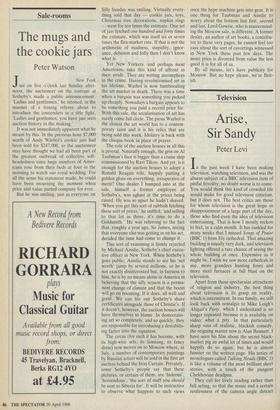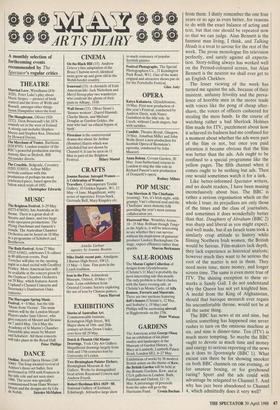Television
Arise, Sir Sandy
Peter Levi
In the past Week I have been making television, watching television, and was the absent subject of a BBC television item of pitiful frivolity; no doubt worse is to come. You would think this kind of crowded life would make for good television criticism, but it does not. The best critics are those for whom television is the great hope or disappointment of a large part of the day, those who find even the idea of television entertaining. That is how I mostly reckon to feel, in a calm month. It has rankled for many weeks that I missed Songs of Praise (BBC 1) from Ely cathedral. That amazing building is usually very dark, and television lighting offered a rare chance of seeing the whole building at once. Expensive as it might be, I wish we saw more cathedrals in use, more grandees hunting foxes and more steel furnaces at full blast on the television.
Apart from these spectacular attractions of religion and industry, the best thing about television is its grasp on reality, which is intermittent. In our family, we still look back with nostalgia to Mike Leigh's Abigail's Party, which I understand is no longer repeated because it is available on video: what a pity. In that particularly sharp vein of realistic, blackish comedy, the reigning master now is Alan Bennett. I have seen his film about the secret black- market pig an awful lot of times and would happily do so again; but he is almost funnier on the written page. His series of monologues called Talking Heads (BBC 1) is like a volume of the most brilliant short stories, with a touch of the pungent Chekhovian deadpan.
They call for lively reading rather than full acting, so that the music and a certain restlessness of the camera angle detract from them. I dimly remember the one four years or so ago as even better, for reasons to do with the exact balance of acting and text, but that one should be repeated now so that we can judge. Alan Bennett is the funniest man living, I think, and Talking Heads is a treat to savour for the rest of the week. The prose monologue fits television perfectly, and surely against all expecta- tion. Story-telling always has worked well on the Pernod-coloured screen, but Alan Bennett is the nearest we shall ever get to an English Chekhov.
The lesser viewing of the week has turned me against the ads, because of their insistent, unfunny frivolity and the preva- lence of horrible men in the motor trade with voices like the pong of cheap after- shave, the voices of officers cashiered for stealing the mess funds. In the course of watching rather a bad Sherlock Holmes film made for ITV, puzzlement about how it achieved its badness had me confused for a moment about whether the ads were part of the film or not, but once you paid attention it became obvious that the film was better than the ads. Ads ought to be confined to a special programme like the yellow pages. The fifth channel when it comes ought to be nothing but ads. Then one would sometimes watch it for a lark.
Like better-informed Spectator writers, and no doubt readers, I have been musing inconclusively about bias. The BBC is rather a serious organisation which on the whole I trust: its prejudices are only those of the times and the class of journalists, and sometimes it does wonderfully better than that. Daughters of Abraham (BBC 2) was sharp and liberal as you might expect, and well made, but if an Israeli team took a similarly crisp attitude to history while filming Northern Irish women, the British would be furious. Film-makers lack depth, they lack experience as historical analysts; however much they want to be serious the root of the matter is not in them. They need more time, more money, and longer screen time. The same is even more true of ITV. The shining exception to these re- marks is Sandy Gall. I do not understand why the Queen has not yet knighted him. A medal from the King of Afghanistan, should that baroque monarch ever regain his uncomfortable throne, would not be at all the same thing.
The BBC has news at six and nine, but unless something has happened one never rushes to turn on the ominous machine at six, and nine is dinner-time. Ten (ITV) is much more tempting. So maybe the BBC ought to devote as much time and money and energy to serious reporting of the news as it does to Sportsnight (BBC 1). What excuse can there be for showing snooker on both BBC channels on one evening, or for amateur boxing, or for greyhound racing? Sport and the ads could with advantage be relegated to Channel 5. And why has jazz been abandoned to Channel 4, which admittedly does it very well?



























































 Previous page
Previous page